
*
The Edinburgh Festival is annually the world's largest arts jamboree; the fringe alone this year had nearly 2,700 shows to choose from, all crammed into a three-week period, in an non-curated free-for-all (and many of them increasingly all for free, too, as the free fringe expands and putting on theatre turns into a form of busking where the hat is passed around after the show). I went direct from seeing 31 shows in a week at Edinburgh earlier this month to Stratford, Ontario, where an altogether more manageable, and also ultimately more satisfying, festival awaits every year, too: the Stratford Shakespeare Festival.
I saw 11 out of the 14 shows in this year's wide-ranging program, that stretches from Shakespeare to Schulz's Peanuts (a production of You're A Good Man, Charlie Brown), by way of Sophocles (Elektra) and Gilbert and Sullivan (The Pirates of Penzance), plus a new Canadian play and musical, and two solo turns from a big Canadian star actor Christopher Plummer and an unknown one Alon Nashman. I was there for only five-and-a-half days, yet managed to take in so much because this is a true repertory festival, with performances twice daily in each of the three main houses, plus a Studio Theatre.
The sheer number of performances that are scheduled is a source of wonder in itself, not just for logistical reasons in terms of turnaround between shows, but also for drawing audiences: with a seating capacity of 1,833 in the main Festival Theatre alone, and a further 1,079 in the proscenium Avon Theatre, that's 5,824 seats to sell each day on a two-show day in those two houses; add in another 480 seats in the thrust-stage Tom Patterson Theatre and another 260 in the Studio, and there are over 7,000 seats to sell a day here. That's the equivalent of filling the U.K.'s National Theatre, with its three auditoria, three times over; or more than Radio City Music Hall.
| |
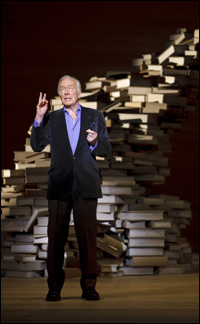 |
|
| Christopher Plummer in A Word or Two. | ||
| photo by David Hou |
The global theatrical legacy of this building has stretched from Minneapolis (where Guthrie has a theatre named after him) to Britain's Chichester Festival Theatre (which was modeled on Stratford) and New York's Vivian Beaumont Theatre at Lincoln Center, and it has been a mixed blessing. I'm not sure that there's really a replacement for a conventional proscenium auditorium, where everyone is experiencing the same direct view, even if some people are inevitably closer to the action than others.
But neither is there any substitute for the excitement and sense of industry that permeates a town like this that is focused so strongly on a theatre plant at its center. You feel that the whole place revolves around it, and that it is now rooted into its very fabric. There's also a wonderful sense of theatrical continuity here, with actors like Brian Bedford and Christopher Plummer who have made Stratford their main theatrical home.
| |
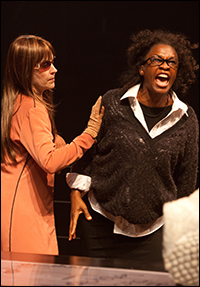 |
|
| Laura Condlln and Yanna McIntosh in Elektra. | ||
| Photo by Cylla von Tiedemann |
Plummer's show is directed by Des McAnuff, who retires as artistic director after this season, whose own production here last year of Jesus Christ Superstar also transferred to Broadway. McAnuff may be best known, of course, for such Broadway hits as Jersey Boys and The Who's Tommy (which he will return to Stratford next year as a guest director to re-stage), but Stratford also provides him with an opportunity to test his mettle as a serious classical director, too, and his staging this year of Henry V on the main Festival Theatre stage is an epic, traditional pageant galvanized by an exciting performance by Aaron Krohn in the title role. I saw Krohn last year, too, as Lenny in a production of Pinter's The Homecoming, and one of the pleasures of visiting Stratford, just as it is with the U.K. equivalent that is the home of the Royal Shakespeare Company, is the chance to watch actors grow in stature and contrast. You also, of course, watch them here between different shows in the same season: Seana McKenna, the Dolly Levi in The Matchmaker, for instance, is also Clytemestra in Elektra, but she is also a local star known for many Stratford seasons.
| |
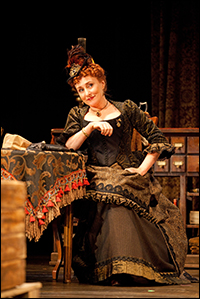 |
|
| Seana McKenna in The Matchmaker. | ||
| photo by Cylla von Tiedemann |
And before becoming a full-time theatre person, Bruce had, according to an obituary in the Toronto Star in 2007, held a day job as an office machinery salesman for Remington Rand, and at the end of his first season as a Stratford actor, he once recalled, "I got a big check from Remington Rand even though I was on a leave of absence. It was the commission from a whole room of typewriters I had sold ….. just before I started working at Stratford. It was more money than I'd made all season from the theatre. And I said, 'Am I crazy? Do I really want to go into this business?' And I did. When I left my job selling something solid like typewriters to work for something as shaky as the Stratford Festival, everybody thought I was crazy. Well look at things now. Who would have guessed the Stratford Festival would outlast the typewriter?"
It's proof, again, that theatre is one thing that will never become redundant, even if the world around us is changing rapidly. And sometimes, clearly, you should just follow your passion. Stratford is full of it, and has plenty to be passionate about. It may very well be what I hope heaven will be like. There's world-class professional theatre; great accommodations; terrific informal restaurants (all of whom ask you if you are going to see a show first, though there really isn't any need: everyone seems to be!); and a beautiful river running through it (yes, it's called the Avon).
| |
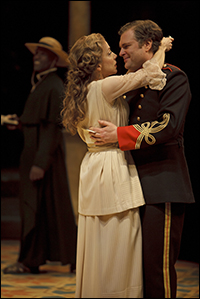 |
|
| Deborah Hay and Ben Carlson in Much Ado About Nothing. | ||
| Photo by David Hou |
In the midst of so much theatre, of course, you may need a break, or at least a glass of fine wine. Stratford is in the heart of vineyard country, so a glass is never far away; as a non-drinker, however, I sought my refuge in sugar. And if a constant diet of classical theatre going can be heavygoing, it's no wonder that Charles Isherwood, who was also in town for the New York Times, and I took daily fortifying post-matinee trips to the local DQ, with blizzard ice cream sundaes mixed with Slor and mini-Rolo's became a favorite for both of us.
Shakespeare, of course, remains the backbone of the festival — in addition to McAnuff's Henry V, this year's season includes a revelatory production of Cymbeline (directed by incoming 2013 artistic director Antoni Cimolino, who rose from actor to director to administrator over 20 years) that's infused with real theatrical magic, plus a sunny, funny production of Much Ado About Nothing. But the biggest pleasure for me was seeing Thornton Wilder's The Matchmaker for the first time, a play that is far more radical, daring and hilarious than those of us who know it only from the Jerry Herman musical Hello, Dolly! that it provided the basis of might have suspected.
And, in a 60th anniversary season, it was also lovely to see the festival pay tribute to one its former artistic directors, John Hirsch, in a one-man show simply entitled Hirsch, who led the company for five seasons from 1981 but whose own story — from being orphaned in the Holocaust to dying in another holocaust of an AIDS-related illness in 1989 — is one that touches two giant tragedies, yet is also about the redemptive power of theatre itself, spellbindingly played by Alon Nashman.
| |
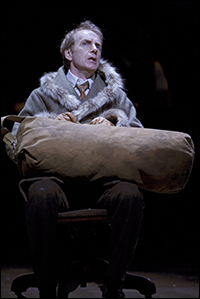 |
|
| Tom Rooney in Wanderlust. | ||
| photo by David Hou |
I already can't wait to go back for the 61st season next year, in which highlights will include the return of two Brians — Bedford as Shylock in The Merchant of Venice, Dennehy in Schiller's Mary Stuart and Beckett's Waiting for Godot — as well as Des McAnuff reprising the aforementioned The Who's Tommy, and Dona Feore directing Fiddler on the Roof.
*
Read more about Stratford's coming 61st season next year.
*
The Stratford Shakespeare Festival's 2012 season continues to Oct. 28 in Stratford, Ontario. The full season includes Much Ado About Nothing; 42nd Street, The Matchmaker; Henry V; You're a Good Man, Charlie Brown; The Pirates of Penzance; A Word or Two (now closed); Cymbeline; Wanderlust; Elektra; MacHomer (now closed); The Best Brothers; Hirsch and The War of 1812 (now closed). For more information, visit stratfordfestival.ca.
Browse a gallery of photo highlights from this year's festival:
























































